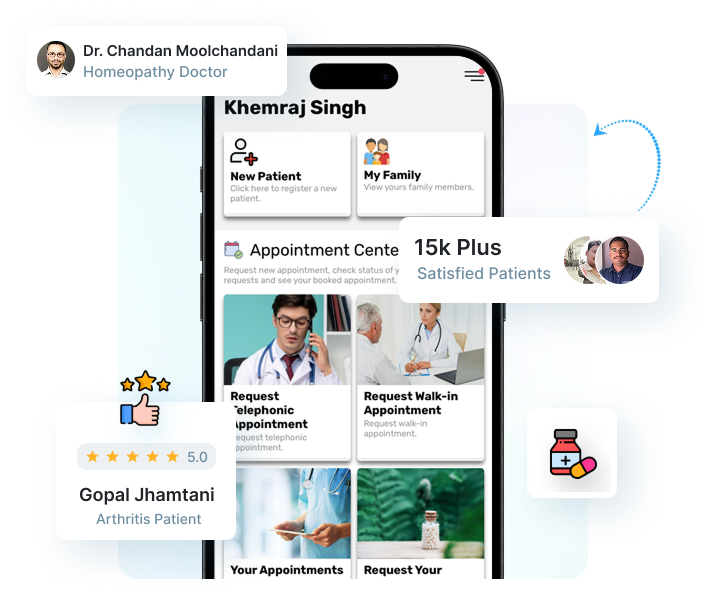What Exactly is Hypertension?
Hypertension, commonly known as high blood pressure, is a chronic (long-lasting) medical condition in which the force of the blood against the artery walls is consistently too high. It often develops over many years and may not show any symptoms in the early stages, which is why it’s called a “silent killer.” If left unmanaged, it can lead to serious health problems such as heart disease, stroke, and kidney failure. Hypertension can affect people of all ages but is more common in adults and the elderly. Regular monitoring and lifestyle modifications are crucial to manage this condition effectively.
Diagnosis & Tests for Hypertension
Hypertension is often diagnosed during a routine medical checkup by measuring blood pressure using a sphygmomanometer. The diagnosis is confirmed if readings consistently show elevated blood pressure over multiple visits.
Common diagnostic tests for hypertension include:
- Blood Pressure Monitoring: Multiple readings over time to confirm persistent high blood pressure.
- Urine Tests: To check for kidney issues which can be both a cause and effect of hypertension.
- Blood Tests: To evaluate cholesterol levels, blood sugar, and kidney function.
- ECG (Electrocardiogram): To detect any signs of heart damage or irregular heartbeats.
- Echocardiogram: To assess the heart’s structure and function if complications are suspected.
Common Causes and Risk Factors of Hypertension
The exact cause of hypertension may not always be clear, especially in primary hypertension, but several factors increase the risk of developing it. Secondary hypertension often has an identifiable underlying cause.
- Genetics: A family history of high blood pressure increases risk.
- Age: Risk increases with age, especially after 40.
- Obesity: Excess body weight strains the heart and blood vessels.
- Poor Diet: High intake of salt, saturated fats, and processed foods.
- Physical Inactivity: Lack of exercise contributes to weight gain and poor circulation.
- Chronic Conditions: Such as diabetes, kidney disease, or sleep apnea.
- Stress & Smoking: These can temporarily increase blood pressure and damage arteries over time.
Symptoms of Hypertension

Headaches

Dizziness or Lightheadedness

Shortness of Breath

Chest Pain

Nosebleeds

Blurred Vision
Types Of Hypertension
| Types of Hypertension | Description |
|---|---|
| Primary Hypertension | The most common type, also known as essential hypertension, where high blood pressure develops over time with no specific cause identified. It is usually related to lifestyle factors such as diet, physical inactivity, and genetics. |
| Secondary Hypertension | Occurs due to an underlying condition like kidney disease, hormonal disorders, or the use of medications such as birth control pills or decongestants. It is typically more severe than primary hypertension and can often be treated by addressing the underlying cause. |
| Gestational Hypertension | Develops during pregnancy, typically after the 20th week. It can lead to complications for both mother and baby if not monitored and controlled, though it often resolves after childbirth. |
| Pulmonary Hypertension | Refers to high blood pressure in the arteries of the lungs. It can be caused by various factors, including chronic lung diseases, heart defects, or blood clots, and often leads to difficulty breathing and fatigue. |
| White Coat Hypertension | Occurs when a person’s blood pressure increases in a clinical setting due to anxiety or nervousness, often resulting in falsely high readings. |
| Masked Hypertension | When a person’s blood pressure is normal in a healthcare setting but elevated at home or in other situations. It can be difficult to diagnose and manage without home blood pressure monitoring. |
FAQ
क्या आपकी दवाइयों के कोई साइड इफेक्ट्स भी होते हैं?
नहीं, हमारी होम्योपैथिक दवाइयाँ 100% प्राकृतिक होती हैं और इनमें किसी भी प्रकार के हानिकारक केमिकल का उपयोग नहीं किया जाता। यही कारण है कि इन दवाओं के कोई ज्ञात साइड इफेक्ट्स नहीं होते, और ये हर उम्र के व्यक्ति के लिए सुरक्षित होती हैं।
आपकी क्लिनिक/अस्पताल की ओपनिंग टाइमिंग क्या है?
हमारा क्लिनिक हर दिन सुबह 8:00 बजे से शाम 10:00 बजे तक खुला रहता है।
क्या अपॉइंटमेंट लेना ज़रूरी है या वॉक-इन की सुविधा भी है?
हम अपॉइंटमेंट को प्राथमिकता देते हैं, लेकिन इमरजेंसी केस या वॉक-इन मरीजों के लिए भी व्यवस्था उपलब्ध है।
क्या ऑनलाइन अपॉइंटमेंट की सुविधा है?
हाँ, आप हमारी मोबाइल ऐप के माध्यम से ऑनलाइन अपॉइंटमेंट बुक कर सकते हैं।
क्या आपकी दवाइयों के साथ कोई कठोर परहेज करने पड़ते हैं?
होम्योपैथिक दवाओं के साथ आमतौर पर कोई कठोर परहेज नहीं होता। आपको सिर्फ उन चीज़ों से बचना चाहिए जो आपकी बीमारी को बढ़ा सकती हैं। हर व्यक्ति की स्थिति अलग होती है, इसलिए सही परहेज की जानकारी के लिए हमारे डॉक्टर से सलाह लेना बेहतर रहेगा।
क्या मैं मोबाइल पर कॉल करके भी अपॉइंटमेंट बुक कर सकता हूँ?
हाँ, बिल्कुल! आप हमें 📞 +91 77910 77910 पर कॉल करके आसानी से अपॉइंटमेंट बुक कर सकते हैं। हमारी टीम आपको जल्द से जल्द उपलब्ध समय बताकर बुकिंग कंफर्म कर देगी।
होम्योपैथी दवाइयाँ किस चीज से बनाई जाती हैं?
होम्योपैथिक दवाइयाँ 100% प्राकृतिक स्रोतों से तैयार की जाती हैं, जैसे जड़ी-बूटियाँ, खनिज (मिनरल्स), और कुछ विशेष पशु-उत्पाद। इन पदार्थों को खास प्रक्रिया से बहुत ही सूक्ष्म मात्रा में तैयार किया जाता है — पहले इन्हें पीसकर (triturate) फिर विशेष तरल में मिलाया जाता है। इस प्रोसेस की वजह से ये दवाइयाँ सुरक्षित मानी जाती हैं और इनका कोई ज्ञात साइड इफेक्ट नहीं होता।
कौन-कौन सी बीमारियों का इलाज होता है? हम निम्नलिखित बीमारियों और सेवाओं के लिए विशेषज्ञ उपचार प्रदान करते हैं:
- बुखार, सर्दी-खांसी, वायरल इंफेक्शन
- मधुमेह (डायबिटीज)
- ब्लड प्रेशर
- स्किन से जुड़ी समस्याएं
- बच्चों की बीमारियाँ
- महिलाओं की स्वास्थ्य संबंधी समस्याएँ
- सामान्य फिजिशियन सलाह
- वैक्सीनेशन और हेल्थ चेकअप
अगर मुझे कोई समस्या आती है तो मैं किससे संपर्क करूं?
आप हमारे "संपर्क करें" पेज पर जाकर हमसे ईमेल या फोन के जरिए संपर्क कर सकते हैं। हमारी ग्राहक सेवा टीम आपकी मदद के लिए हमेशा तैयार है।
 Book an Appointment – Call Us at
Book an Appointment – Call Us at  102-103, Ganpati Tower, Near Nursery Circle, Vaishali Nagar, Jaipur
102-103, Ganpati Tower, Near Nursery Circle, Vaishali Nagar, Jaipur




